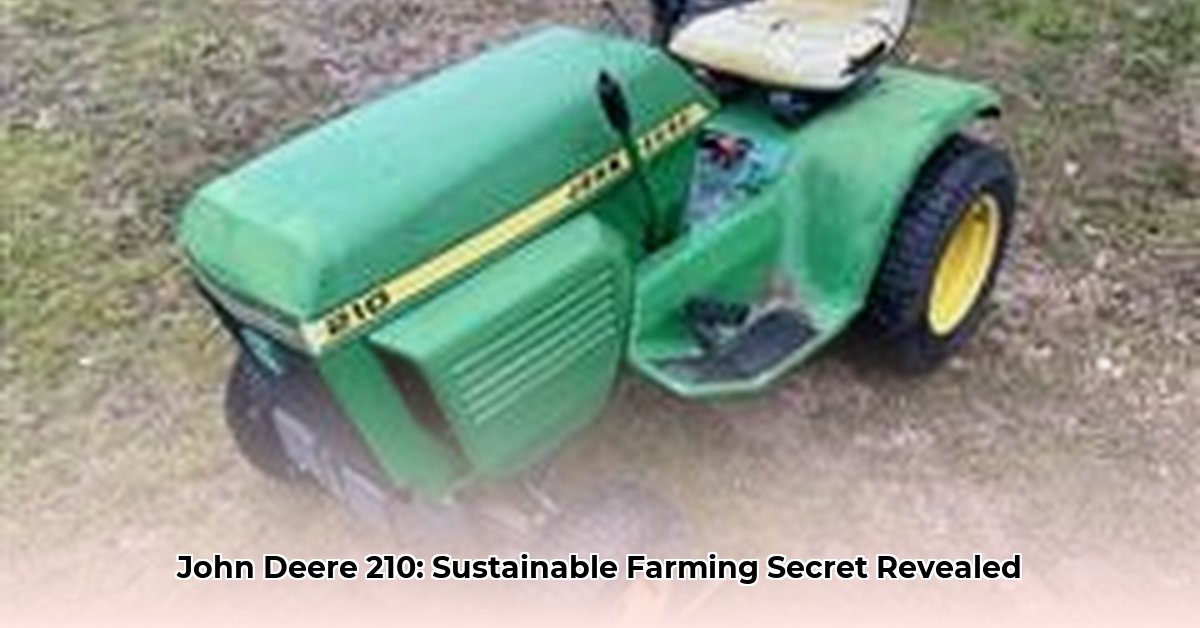
The John Deere 210 lawn tractor, a ubiquitous sight on farms between 1975 and 1987, represents more than just a piece of vintage machinery; it embodies a pivotal moment in small-scale farming mechanization and offers valuable insights into the evolution of sustainable agricultural practices. This article delves into the 210's history, technical specifications, environmental impact, and lasting legacy, exploring how it shaped farming practices and what lessons we can learn for a more sustainable future. For a comparison to earlier models, see more about the John Deere Model A.
A Look Back: The John Deere 210 and the Mechanization of Small Farms
The agricultural landscape of the 1970s was characterized by labor-intensive farming methods. The John Deere 210 emerged as a game-changer, offering small-scale farmers a significant boost in productivity. Its introduction marked a shift towards mechanization, promising increased efficiency and potentially higher profitability. But did this mechanization come at a cost? This is the key question that fuels our analysis. The tractor's simple design, robust construction, and versatility—thanks to a range of compatible attachments—quickly made it a popular choice for diverse tasks, from mowing and plowing to snow removal. This adaptability likely extended its useful life, potentially offsetting some environmental impacts associated with shorter-lived machinery.
Technical Specifications and Operational Capabilities
The John Deere 210 boasted a 10-horsepower Kohler 390cc engine, a respectable power output for its era. While precise historical fuel consumption data remains elusive, it's safe to assume its fuel efficiency was lower than that of modern tractors. This begs the central question: How does the fuel consumption of the John Deere 210 compare to modern, more fuel-efficient counterparts? The lack of readily available, detailed historical data regarding fuel efficiency makes it challenging to quantify its impact accurately. However, its robust construction and long operational lifespan offer a potentially mitigating factor.
Assessing the Environmental Footprint
The John Deere 210's environmental impact is a complex issue. Its likely higher fuel consumption compared to contemporary tractors almost certainly resulted in increased greenhouse gas emissions. However, a complete sustainability assessment must consider its longevity. Experts argue that the machine's extended lifespan, and consequently, reduced replacement needs, might have partially mitigated its initial higher fuel consumption impact. This requires further investigation and quantitative analysis, highlighting a critical need for additional research into the long-term environmental consequences of agricultural mechanization.
The John Deere 210's Legacy: Shaping Farming Practices
The 210 played a vital role in the broader mechanization of small farms, leading to increased efficiency and productivity. This mechanization, however, introduced both opportunities and challenges. The reliance on fossil fuels created a dependence on non-renewable resources, contributing to climate change. Furthermore, increased efficiency resulted in changes in farm labor, possibly leading to displacement and concentrated land ownership. The long-term economic and social consequences alongside environmental concerns deserve careful consideration and further investigation.
Comparative Analysis: The 210 vs. Modern Tractors
A comprehensive comparison between the John Deere 210 and modern tractors presents a crucial next step in our analysis. Detailed data on fuel efficiency, emissions, and operational lifespans for various models would allow for a more accurate and rigorous environmental impact assessment. Such a study should also consider factors beyond just fuel use, including manufacturing processes, materials used, and end-of-life management. Only through this comparative analysis can we truly grasp the trade offs involved in the evolution of agricultural machinery.
The Future of Sustainable Small-Scale Farming
The legacy of the John Deere 210 presents a mixed picture. While significantly boosting agricultural productivity, its fuel consumption highlights the urgent need for innovative, energy-efficient farming equipment, especially for small-scale operations. The growing global interest in sustainable and resilient farming practices emphasizes the need for future tractors to minimize fuel consumption, reduce emissions, and utilize alternative energy sources. Research into electric or hybrid systems holds great promise for revolutionizing the future of agricultural machinery.
Actionable Recommendations for a Greener Future
To promote sustainable practices in small-scale farming, various stakeholders need to commit to specific actions:
Small-Scale Farmers: Regular equipment maintenance, improved fuel management through driving techniques, and exploration of fuel-efficient technologies are crucial steps. Long-term strategies should include investments in energy-efficient machinery and potentially renewable energy sources for farm operations.
Researchers: Conduct comprehensive lifecycle assessments of older and newer agricultural machinery, focusing on fuel efficiency, emissions, and overall environmental impact. Invest in R&D for sustainable technologies and practices, including alternative energy sources for farm equipment.
Equipment Manufacturers: Prioritize fuel efficiency and durability in new designs. Invest heavily in R&D of sustainable farm equipment using alternative energy sources and focusing on extended lifespans to minimize resource consumption.
Policy Makers: Provide subsidies and incentives that support the adoption of sustainable technologies and practices by small-scale farmers. Create clear policies fostering responsible disposal and recycling of end-of-life farm equipment.
The John Deere 210 serves as a powerful reminder of the evolution of agricultural mechanization. Its enduring legacy prompts a critical evaluation of both its contribution to productivity and its limitations in the context of modern sustainability standards. By learning from the past, we can pave the way for a more responsible and sustainable future for small-scale farming.